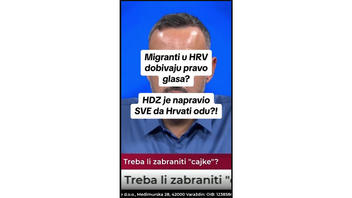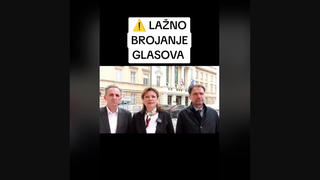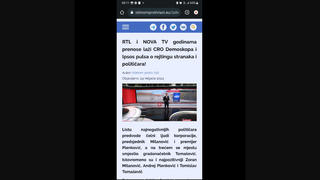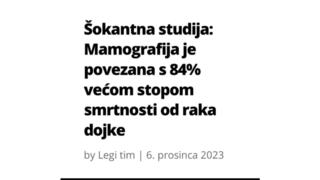
Will migrants have the right to vote in the Republic of Croatia? No, that's not true: Currently, in Croatia, foreign citizens who wish to obtain the right to vote must have a permanent or temporary residence status in the country and they have to apply for registration in the voters' register three months before the elections they wish to vote in. Lead Stories did not find any information on new laws in preparation that would allow migrants in Croatia to vote.
The claim appeared in a video (archived here) published on TikTok by the official page of the TV Talk Show "Voice of the People," edited and hosted by journalist Pasko Tomaš, on October 17, 2023. Translated from Croatian to English by Lead Stories staff, it opened:
Are migrants in Croatia getting the right to vote? Has HDZ done EVERYTHING to make Croatians leave?!
This is what the post looked like on TikTok at the time of writing:
(Source: TikTok screenshot taken on Thu Oct 26 17:27:22 2023 UTC)
The person speaking in the video states that HDZ (the ruling party in Croatia) did everything to make as many Croatians as possible leave while making as many migrants as possible come to Croatia. He says that compared to last year, there are more and more migrants and that they will get the right to vote, the only question is when: Whether in five years, ten years, maybe even in three years, but they will get it. He adds that HDZ will not survive otherwise. When the host asks him why someone from Nepal would vote for HDZ, the speaker explains that if the party lets a person without documents come to Croatia and gives him an apartment - their vote is secured.
According to data from the Bureau of Statistics, in 2022, a total of 57,972 people immigrated to the Republic of Croatia from abroad, 17.8% of which were returning Croatian citizens (10,319 in total) and 82.2% (47,653 in total) were foreigners. Additionally, 36,000 people migrated to Croatia illegally, according to an article on the Croatian government's official website. A total of 46,287 people moved abroad. In 2021, a total of 35,915 people immigrated to the Republic of Croatia. Additionally, 17,404 people illegally crossed the border, according to the Yearly National Report issued by the Ministry of Internal Affairs. A total of 40,424 people moved abroad.
In Croatia, asylum or subsidiary protection can be granted to people whose lives would be endangered by returning to their country of origin. When a foreigner is granted asylum or subsidiary protection in the Republic of Croatia, the person has the right to stay and is provided with accommodation at the expense of the state, for a maximum of two years from the date of execution of the decision granting asylum or subsidiary protection. So, not all migrants in Croatia receive free accommodation at the cost of the state, as implied in the TikTok.
Foreign citizens who want to obtain the right to vote in Croatia must apply for registration in the voters' register at the local election office in the city or municipality where they live at least three months before the election, to be able to vote. They must have a permanent or temporary residence status in Croatia, which is granted as follows:
Temporary residence may be granted to a citizen of a third country for several different reasons, such as family reunification, secondary education, study, research, humanitarian reasons, life partnership, work, posted work, or if a person has a long-term residence in another EEA member state, or in case the person is a "digital nomad." Temporary residence will be approved if the person proves the purpose of the temporary residence, has a valid travel document, has means of support, has health insurance, has proof of not having been legally convicted for criminal offenses from the home country or state where the person stayed for more than a year immediately before arriving in the Republic of Croatia, does not have a ban on entry and stay in the Republic of Croatia or a warning issued in the Schengen Information System to ban entry, and does not pose a threat to public order, national security or public health.
A long-term residence permit will be granted to citizens of a third country if they prove to have a valid foreign travel document, means to support themselves, have health insurance, know the Croatian language and the Latin alphabet, and do not pose a danger to the public order or national security.
Currently, then, migrants don't have the right to vote in Croatia, since they would have to obtain a residence permit, first, by fulfilling the above-mentioned conditions. The only exception is the "Decision on the relocation of citizens of third countries or stateless persons who meet the conditions for approval of international protection" approved by the Croatian government on July 28, 2022, under which the Republic of Croatia accepts up to 60 citizens of third countries or stateless persons for relocation.
Lead Stories could not find any publicly available information about new laws being prepared, based on which existing regulations and acts would be amended and migrants would be given the right to vote in Croatia. A search of Google's index of thousands of credible information sources (archived here) performed by Lead Stories on October 23, 2023, using the following terms in Croatian: "Novi zakon o glasanju" or, in English, "New law on voting" produced no results.
A search on the official website of the Croatian government (archived here) using the same keywords also showed no results.











